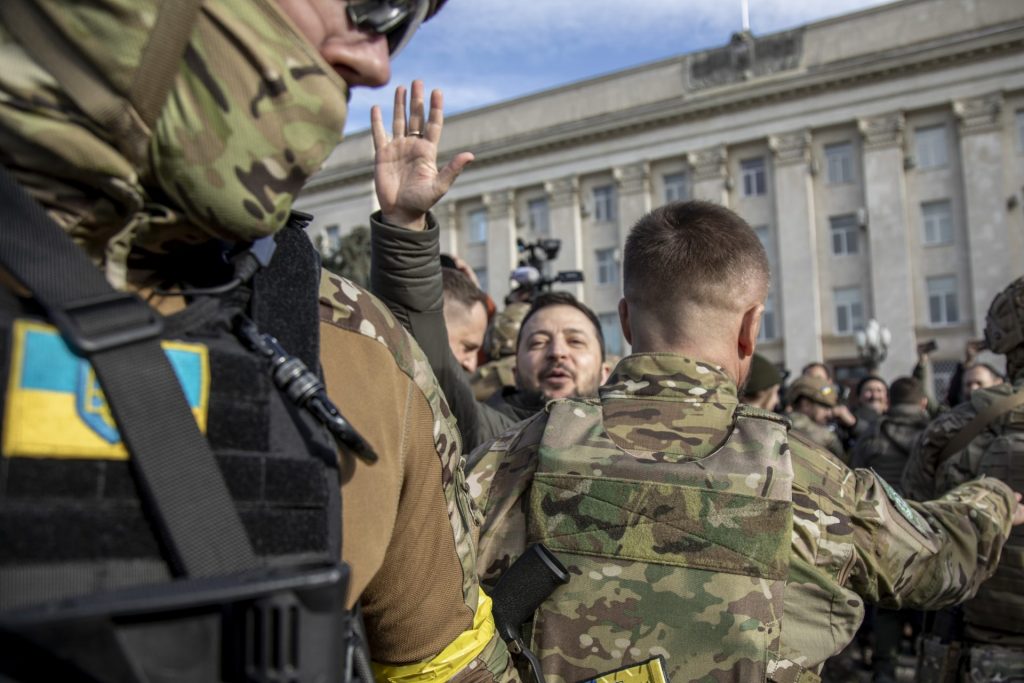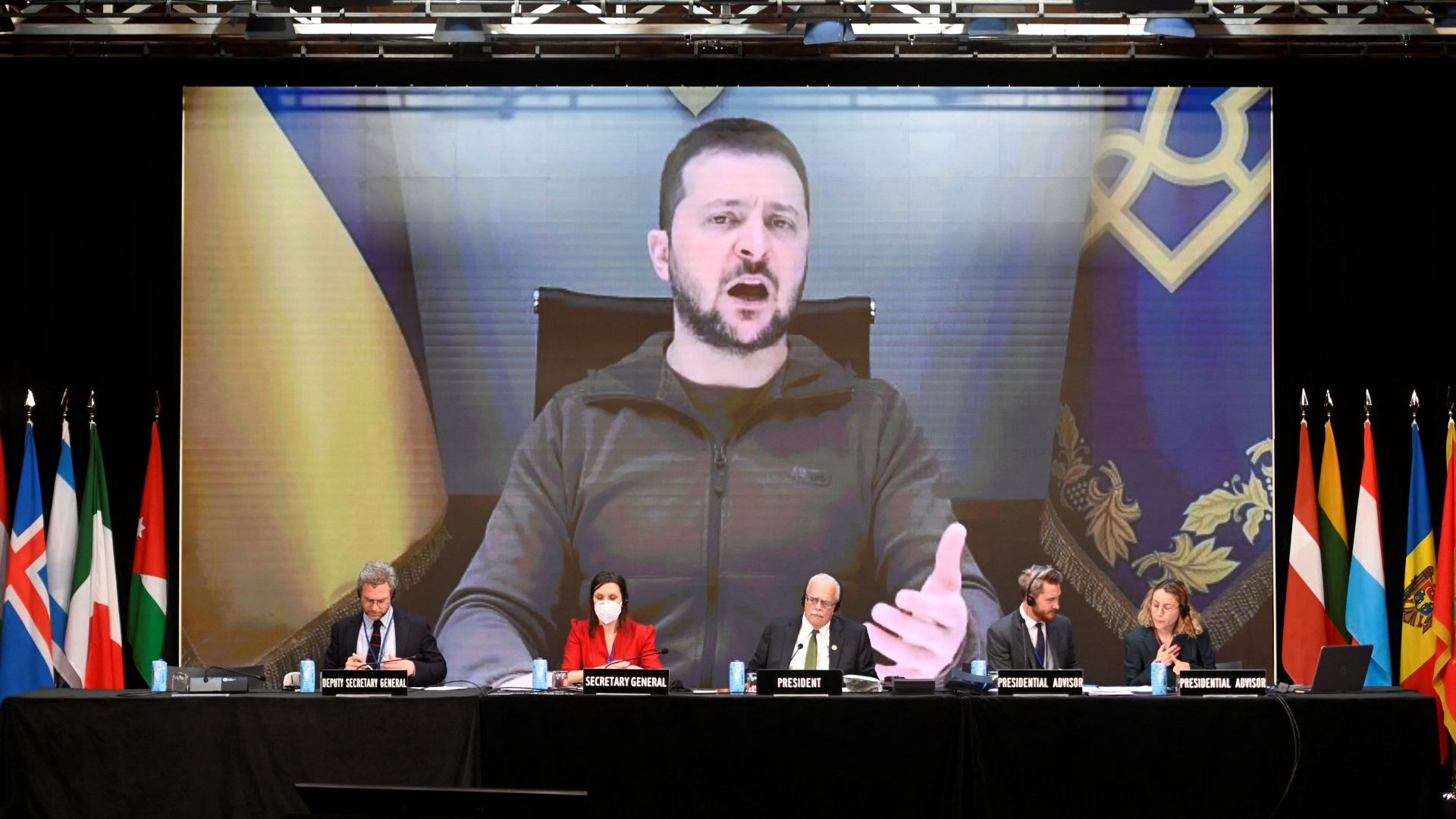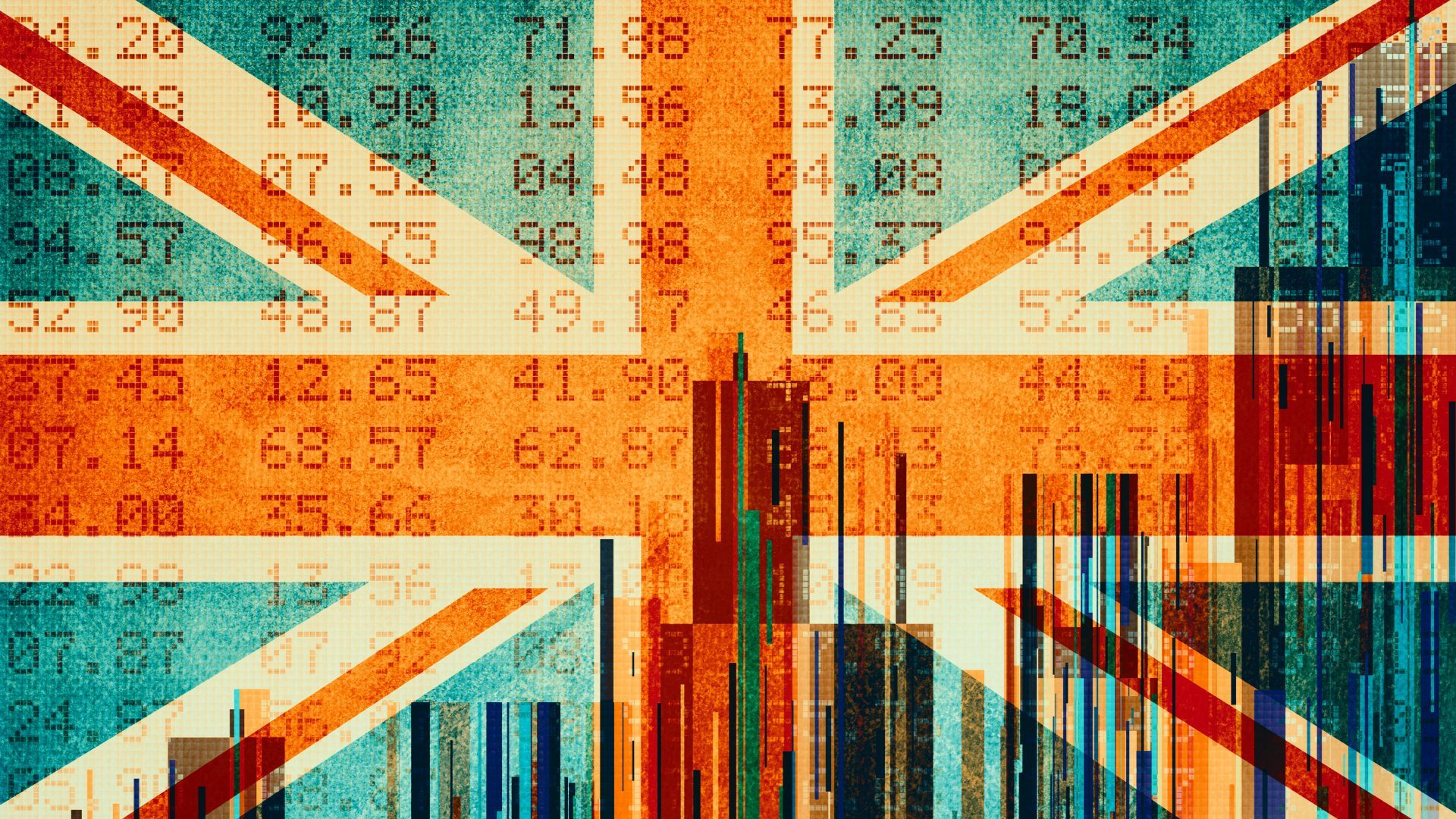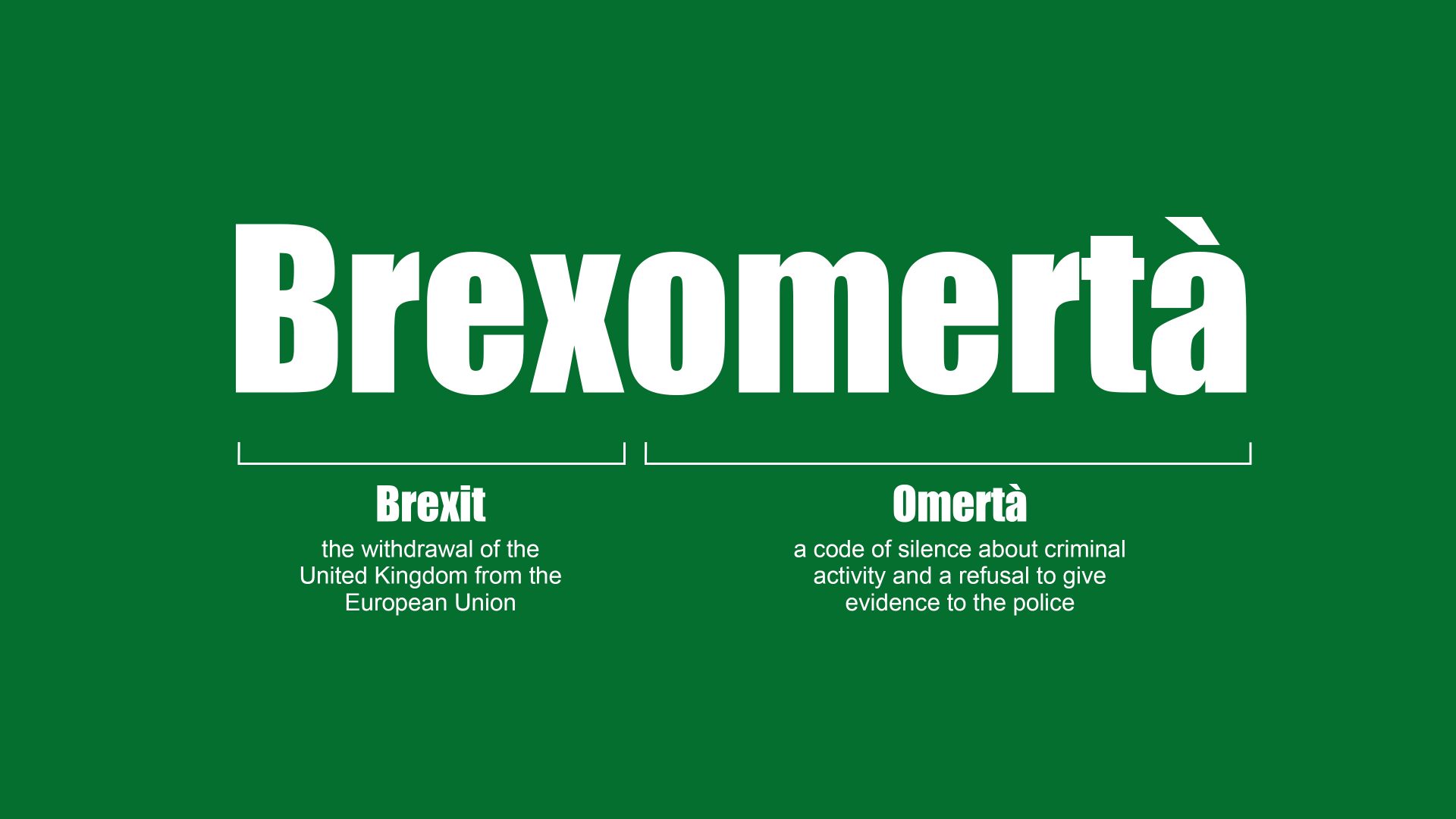Three men in black tie survey the city below them, sipping champagne. They are pondering who to implant as their next chosen president. “Uncontrolled democracy – what an adrenaline rush,” they joke. In Russian.
This is Kyiv, November 2015. The man they choose, a diminutive, baby-faced, stumbling high school teacher is called Vasily Holoborodko. Or rather he is Volodymyr Zelensky. The actor plays the part – and then he becomes the part. This is the opening sequence in the opening episode of Servant of the People, a TV comedy.
The joke was eventually on him. The series ran for four years. It made Zelensky a household figure. Then just as his star was waning, Vladimir Putin inadvertently saved him.
Ten months into the largest military assault on Europe since the second world war, one man personifies Ukraine’s defiance. His elevation from TV celebrity to struggling head of state to the revered face of European liberal democracy is extraordinary, even in this era of upended global politics.
When the story of this war is told it will be divided into four elements: the bravery of Ukrainian soldiers and civilians; the provision of arms by western allies; Russia’s barbarism and self-inflicted defeat; and Zelensky’s masterclass in wartime communications. Ukraine’s leader has given a level of rhetorical support to his people that has been nothing short of Churchillian. That is why he is the New European’s 2022 Person of the Year.
Unlike many in Ukrainian politics, Zelensky had no previous experience in politics or the military. He played no role in the two upheavals that shook the country in the first two decades of this century: the Orange Revolution of 2004-5, and the deadly clashes in Maidan Square in 2014 that forced Viktor Yanukovych, a pro-Kremlin stooge, from office. This ousting prompted the first Russian invasion. Zelensky managed to evade military service.
Servant of the People became such a resounding success for Zelensky and his production company that he registered the name as a political party and, in the middle of season three, he announced he would do what his character did. He would stand for president.
This was 2019. Petro Poroshenko, a long-time member of the political and business elite, had become president in 2014 – just as Putin was annexing Crimea and fomenting war in the eastern region of Donbas. Poroshenko had fallen into the classic role of promising change and delivering a dispiriting status quo.
Even Poroshenko’s anti-corruption commission was found to be corrupt. His company, Roshen, was one of the 20 largest confectioners in the world, providing much of his £1bn fortune and earning him the nickname the “chocolate king”. Meanwhile, he was taking an ever more strident line against the Kremlin – an unusual tactic, given that his combination of oligarchic wealth and supreme political power seemed to mirror the politics of the larger neighbour next door.
It was easy for Zelensky to cast himself as the anti-establishment candidate. With his campaign slogan “I’m Not Kidding”, his biggest task was to persuade people that this 41-year-old actor was serious after all. He need not have worried. Like the character he played in the TV show, he won by a landslide, securing a staggering 73% of the vote in the run-off against Poroshenko. He did so by refusing to engage as a conventional politician. Throughout the election campaign he refused to interrupt his acting work, didn’t bother to debate with Poroshenko and gave no interviews to mainstream media.
Much of Europe was unimpressed. An analysis by the German Council on Foreign Relations in April 2019 described his programme as a “mixture of ideas, wishful thinking and, occasionally, specific policies”. It included plans to end legal immunity for members of parliament, and to hold more referendums. It found Zelensky’s plans for defence and security “rather abstract”, citing a poll showing that only around 20% of his own supporters had any idea where he stood on the EU, Nato or Russia. His party’s offering of “Ukrainian centrism” meant everything and nothing.
The Ukrainian parliament, Verkhovna Rada, contained a host of new faces and this drew comparisons with President Macron’s all-new En Marche movement in France. In the context of the time, the era of peak anti-politics, Zelensky was not unique. Other comics and actors had already made it, from Beppe Grillo in Italy to Donald Trump, to Boris Johnson, with whom he instantly gelled.

Apart from his charisma, Zelensky derived part of his popularity from a vague promise to calm relations with the Kremlin. He assured voters, tired of five years of war in the Donbas, that he would sit down with Putin. Behind the scenes, western governments worried that he might be perhaps a little too willing to get on with Putin.
The two leaders did meet. Their one face-to-face encounter came in December 2019 in Paris, as part of peace discussions involving the French and Germans. A prisoner exchange was agreed, one or two other smaller deals were done, but a wider de-escalation proved elusive. By early 2021 relations were in the deep freeze. Zelensky became increasingly strident in calling for Nato membership for Ukraine. This, it seems, was a red line for Putin.
Domestically, Ukraine was reverting to type – or rather it hadn’t left the type. Endemic corruption was woven into public life and accentuated by weak democratic institutions. In a piece published on February 16, 2022, eight days before Putin’s invasion, and titled “Against all odds: has Zelensky failed Ukraine?”, Forbes magazine ran through the dire economic numbers, showing that capital flight was growing. Having promised “no to nepotism and no to friends in power”, within a year it seemed that the Zelensky clan from the TV station had replaced the Poroshenko clan from the chocolate conglomerate.
As tensions mounted with Russia, Zelensky seemed ill-equipped for the task. By New Year 2022, US intelligence was reporting heavy tank movements, with 120,000 Russian soldiers assembled at the border. The White House was frustrated that several of its allies did not seem to appreciate the immediacy of the danger. Nor, seemingly, did Zelensky.
This was not the Titanic, Ukraine’s president confidently told journalists. Putin was merely trying to scare people, he insisted. Even as citizens nervously checked the internet for the latest news, restaurants and shops continued to operate normally. The first days, hours even, changed everything. Putin assumed the march into Kyiv would be swift and seamless. His forces would be greeted with a mix of enthusiasm and grudging respect, and any resistance would fizzle away.
Zelensky’s first task was to show up on the streets of his capital to reassure his people and the world that he wasn’t dead, he hadn’t fled and wouldn’t be cowed. Day after day he appeared, often on self-filmed mobile phone videos, to show that he was in control. His late-night broadcasts to the nation and the world were steady, powerful and emotional.
The breakthrough moment in the world’s understanding of the war was Zelensky’s visit to Bucha, a suburb of Kyiv, on April 4. With cameras in tow, he inspected evidence of widespread torture and the following day he spoke by video to the UN security council, where he catalogued a series of war crimes. He spoke of people shot on the streets or thrown into wells. “Civilians were crushed by tanks while sitting in their cars in the middle of the road. Women were raped and killed in front of their children.”
As Putin cocooned himself in his residence outside Moscow, hearing only what he wanted to hear, Zelensky’s communications became ever more adept. He produced messages for different parliaments, flattering, cajoling, reproaching. For Britain it was all about Churchill and standing alone against Hitler; for Germany it was about freedom and the tearing down of walls; in an address to the US Congress, he spoke of the terror attacks of 9/11 and Pearl Harbor. He spoke to festival-goers at Glastonbury and summit meetings of chief executives, all by video link, all in his trademark army fatigues, his T-shirt and zip-up fleece. Meanwhile, his wife, Olena Zelenska, was frequently to be seen in world capitals, talking in person to financiers, politicians and opinion-formers, persuading them to do more to help.
His wartime leadership wasn’t only about the message. He assembled a serious and capable team. Oleksii Reznikov, his defence minister, and Dmitry Koleba, his foreign minister, developed their own international networks. Most importantly, his generals have been of a high calibre, and – in stark contrast to the Russian military model – have been allowed to take their own decisions. An enabled government turned an entire country into a fighting machine, forbidding men under 60 from leaving the country and putting the economy on a war footing.
Zelensky’s detractors and adversaries within the country – and there were many – suddenly fell silent. Political grudges were put to one side. Poroshenko took to wearing military garb, calling for unity on every occasion, noting that internal disputes are a boon to Putin. “We are all soldiers now,” he declared.
Relations with the mayor of Kyiv, Vitaly Klitschko, the former world boxing champion, have never been easy. Klitschko was also once mooted as a possible president, but he is now behind the president. Even so, their relationship is still strained. Zelensky recently criticised the mayor for not doing enough to help residents of the capital to cope with power cuts – a consequence of the Kremlin’s relentless bombardment of Ukraine’s energy grid.
The next few months are fraught with danger for Zelensky and Ukraine. Just getting through the winter will require immense resilience and solidarity. The smallest signs of political disharmony will be seized on by the Kremlin.
Putin’s gambit has spectacularly backfired. Having vowed to “de-Nazify” Ukraine, a crass and obscene remark (and not just because of Zelensky’s Jewish heritage), he has been forced with each setback to redefine his war aims. Russia cannot win. But it can still hold on to some of the land it has seized, leaving Ukraine permanently destabilised.
Zelensky’s biggest concern now may not be his enemy, but the resolve of his friends. Western leaders from the US president to the German chancellor and the French president are talking more openly about the need to keep a channel of communication open with Putin. They seek to reassure Zelensky that they are not talking about formal negotiations, that they are not letting concerns about their own public opinion get the better of principle. But the landscape is changing and Ukrainians are fearful of being sold out.
Zelensky has made clear that he will not entertain any idea of peace until Putin commits to giving back all Ukrainian land conquered since 2014. Privately, many western strategists wonder whether a return of Crimea will ever be feasible.
Having withstood horrific bombardment, having foiled an enemy that assumed it would just walk in and take the keys to his capital city, this most unlikely military hero is about to face another stern test. The question is nagging away: what will he and his people have ultimately to show for their courage?
Cast your mind forward to late spring, early summer 2023. The war may have been frozen over the winter, with skirmishes in a number of areas, but with no major progress on either side. Fatigue will have increased on both sides. What happens if Ukraine’s united front starts to corrode? Will Zelensky suffer the same fate as that other great wartime leader, Churchill, when peace did eventually arrive in 1945? He wasn’t thanked for his heroics and was summarily ejected at the ballot box.
And even if Zelensky did survive any such transition, he would be faced with a devastated country, a destroyed economy and a traumatised people.
If that is the more pessimistic scenario, then the more optimistic outlook would end with Ukraine’s membership of the European Union. It will take many years to get there, even once some kind of peace is established, and a full revival of Ukraine’s economy and political culture will take perhaps a generation. But there would be no going back and it would be a historic achievement.
Such hopes are, in any case, for another time. The most immediate task for Ukraine’s leader is to ensure that he and his people have enough heat and food, air defences and ammunition to survive the winter. Volodymyr Zelensky has been a stunningly successful wartime leader. From what we have seen of him, there is every reason to think that he and Ukraine can survive the winter – that they can go all the way.
John Kampfner is a journalist and author of Why The Germans Do It Better




